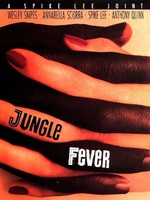If the COVID-19 pandemic hadn't happened, Spike Lee would have presided over this year's Cannes jury. When the festival made public their selections for 2020, I wondered which of those titles would have been rewarded by Lee's jury. It was particularly interesting to consider the director's jury presidency because he's had a somewhat contentious relationship with Europe's most prestigious film festival. Back in 1989, many believed Lee should have won the Palme d'Or for Do the Right Thing (they were right) and, when he came out empty-handed, there was a storm of controversy over the jury's decisions. Two years later, that polemic was still on people's minds as the filmmaker presented Jungle Fever at the Croisette.
Spike Lee would go on to win the Grand Jury Prize for his third film in competition, 2018's BlacKKKlansman, but that wasn't the first time one of his movies had won a Cannes prizes. 1991's aforementioned Jungle Fever managed to win a most unusual prize thanks to Samuel L. Jackson…

Samuel L. Jackson has long been a star now, but his movie success came later in life than one might expect. While studying marine biology in Morehouse College, Atlanta, Jackson joined an acting group, gaining a taste for the performing arts in the process. He'd go on to change his major and pursue a career in acting that started on stage but quickly moved to television and cinema. In 1973, Jackson got his first film role in the blaxploitation flick Together for Days. The part was a supporting one and that would be a constant during the first decades of the actor's career. For a long time, the only sizeable roles that Jackson could get were found on stage. In fact, it was after a performance of A Soldier's Play that he was introduced to Spike Lee, the man who would become one of his most important collaborators.
The director would cast him in some of his earlier pictures, including School Daze and the calcinating Do the Right Thing, but none of those movies proved to be enough to make the actor famous. That would change in 1991, when, after coming out of rehab, 42-year-old Samuel L. Jackson played a small but important role in Lee's Jungle Fever. That picture about interracial relations is a bit of a mess, but its cast is beyond great, every actor sinking their teeth into meaty roles with delirious abandonment.
Among them, Jackson shines brightest, imbuing the character of a self-destructive drug addict with charm, visceral authenticity, and even some humor. As erratic as he is watchable, Jackson's like a hurricane that tears through the mercurial melodrama of the movie with furious intensity. His scenes with Ruby Dee and Ossie Davis' as his bereaved parents are of particular excellence, twisting the picture into a tragedy of operatic proportion.
Reeling from the bad press of the Do The Right Thing controversy and rightfully astounded by Jackson's work, the Cannes jury of 1991 made a somewhat unprecedented decision in the festival's history. From 1979 to 1981, there had been an expansion of the acting categories, allowing for the specific awarding of supporting actors and not just leads. That was a short-lived experiment and, by 1982, Cannes went back to only giving Best Actor and Actress prizes, with no space for the recognition of performers in more limited roles. That temporarily changed during Jungle Fever's year, when the jury decided to go against the festival's rules and handed out another Best Supporting Actor prize, though not a matching trophy for actresses. Samuel L. Jackson was the winner of that honor.

This unexpected success made Jackson a star to watch and he naturally received awards buzz to move into the fall and winter, including a victory at the New York Film Critics Circle Awards. After Jungle Fever, his roles got bigger and showier and a few years later he was an Oscar nominee for his work in Tarantino's Pulp Fiction (1994). The rest is history. While recent years full of collecting paychecks on autopilot as Marvel's Nick Fury might have made people forget it, Samuel L. Jackson is one hell of an actor. Whenever he challenges himself and gets a project worth his salt, the results are astounding.
That being said, it's difficult to imagine Jackson's career turning out as it did without Lee's support and the amazing showcase that is Jungle Fever. The juries of Cannes may be wrong more times than they're right, but that '91 Best Supporting Actor trophy is one of their best decisions.
Maybe Spike Lee's jury would have made similar choices this past month had COVID-19 not happened? We'll never know. At least not for the 2020 slate. Spike Lee will preside over next summer's Cannes jury instead. Lee's latest feature, Da 5 Bloods is coming to Netflix on June 12th. Don't miss it.
